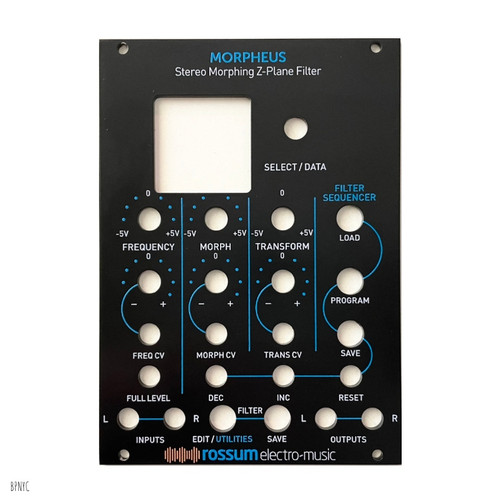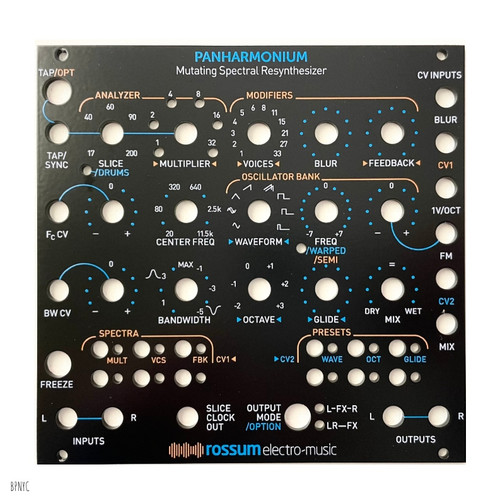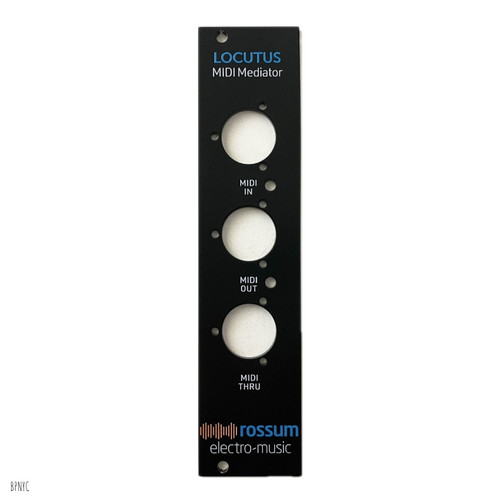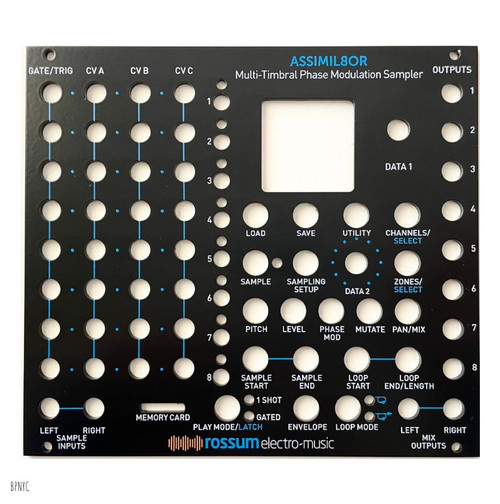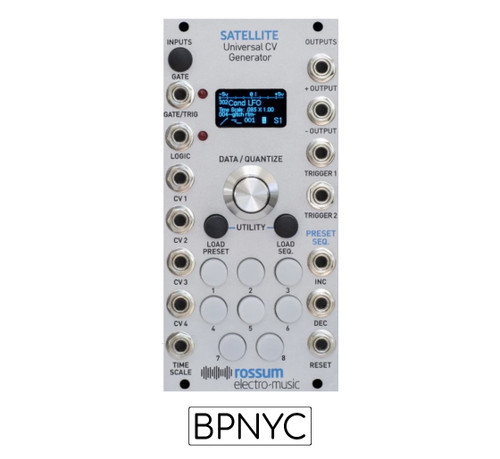Product Overview
Stereo Morphing Z-Plane Filter
With our MORPHEUS digital filter module, we’re finally able to unleash the full power of the 14-pole Z-Plane Filters that Dave invented for the E-mu Morpheus synthesizer.
The MORPHEUS Eurorack module includes over 280 filter configurations, what we call Cubes. Each Cube is composed of up to 8 complex filters that you can picture as being at the corners of a three dimensional cube (hence the name). Morpheus gives you the ability to smoothly interpolate between those 8 filters within the cube’s three dimensional space.
Due to processor limitations back in the day, the original Morpheus was capable of real-time morphing in one dimension, but interpolation in the frequency and transform dimensions were set at note-on and remained static for the remainder of the note. But even with that limitation, Morpheus offered sonic capabilities that are unmatched to this day.
With the MORPHEUS filter module, you now have simultaneous real-time CV control of all three dimensions, for dynamic timbral effects unlike anything you’ve ever heard before. In stereo.
MORPHEUS features include:
• Over 280 14-pole filter configurations
• Real-time manual and CV control of Frequency, Morphing and Transformation
• The ability to save hundreds of customized filter configurations
• A sequencer for stepping through filter configurations under trigger or clock control
• A large OLED display for programming and realtime display of morphing
Like all Rossum Electro-Music digital modules, all parameters are available for adjustment with a single button press. No menu diving.
A Closer Look at What Makes Up a Morpheus Filter
A Morpheus Filter (i.e., what you select and load into Morpheus to process your audio) is actually the top level of a three level hierarchy. The three levels are:
A Frequency Response
This is the most basic construct of a Morpheus filter. It is essentially a single static configuration of Morpheus’s 14 poles and zeros. For example, a frequency response might be configured as six independent bands of parametric EQ and a low pass section.

Even this basic building block is capable of creating filtering and resonant spaces of enormous complexity. But the real power comes from the ability to interpolate between multiple Frequency Responses.
A Cube
A Cube provides the structure we need to control the interpolation between multiple Frequency Responses.
To start with a simple example (actually simpler than any of the actual Cubes), imagine 2 different Frequency Responses and a single morph parameter to interpolate between them.

By varying that single CV-controllable parameter, you’re actually interpolating between 20 different frequency, bandwidth, resonance, and gain parameters simultaneously. We can visualize the result as looking something like this:

The next step would be to add another pair of Frequency Responses and control them with two parameters. That would look something like this:

In this case, the two parameters (Frequency and Morph) define a point on a virtual plane that specifies the interpolation between the four Frequency Responses. Cubes like this are referred to as ”.4” cubes.
Finally, by adding four more Frequency Responses, we have a full 3D Morpheus Cube, now controlled by three parameters, Frequency, Morph, and Transform.


In this case, you will be interpolating between all 8 component Frequency Responses,controlled by the position of the single interpolation point within the virtual 3D space. For ease of visualization, this is displayed (along with the resulting output frequency response) on Morpheus’s graphic display.
A Morpheus Filter
Finally, at the top level of our hierarchy is the fully-configured Morpheus Filter. This consists of one of the 289 Cubes and the various parameters set in Morpheus’s Edit Filter Menu.
Distortion
In addition to three dimensional filtering, Morpheus is capable of producing a wide variety of unusual and distinctive types of distortion (depending on the character of individual cubes and the nature of the signals being processed). This is separate from the usually unwanted distortion produced by overdriving the input or by too high a gain through the filter.
All of the Morpheus Filters that are based on “.4” Cubes have the Transform control knob and CV input set to control distortion (since with only 4 Frequency Responses, there is no Transform axis to control anyway). However, even for the full 3D Cubes, you have the option of programming the Transform control and CV to control distortion, in which the the actual Transform value is set as a static value in the Edit Filter Menu.
Suffice it to say, Morpheus distortion adds an additional (and highly dramatic) option to its sound design capabilities.
Morpheus Specifications
FILTER CUBES
289
FILTERS
1000
FILTER SEQUENCES
200
SEQUENCE STEPS
20,000 Dynamically Allocated
INPUTS
Audio L/R
2x 3.5mm mono socket
100kΩ Input Impedance
Full Level Frequency CV
1x 3.5mm mono socket
100kΩ Input Impedance
Attenuverted Frequency CV
1x 3.5mm mono socket
100kΩ Input Impedance
Attenuverted Morph CV
1x 3.5mm mono socket
100kΩ Input Impedance
Attenuverted Transform/Distortion CV
1x 3.5mm mono socket
100kΩ Input Impedance
Filter Sequencer Dec
1x 3.5mm mono socket
100kΩ Input Impedance
1.6V threshold
Filter Sequencer Inc
1x 3.5mm mono socket
100kΩ Input Impedance
1.6V threshold
Filter Sequencer Reset
1x 3.5mm mono socket
100kΩ Input Impedance
1.6V threshold
OUTPUTS
Audio L/R
2x 3.5mm mono socket
1kΩ Impedance
POWER REQUIREMENTS
+/-12V via 16-pin, Doepfer-style connector
CURRENT DRAW
135mA +12V, 25mA -12V (maximum)
DIMENSIONS
18HP (W); Panel to power connector (with connector plugged in) 25mm (D)
SUPPLIED ACCESSORIES
1x 16-pin, Doepfer-style cable
4x M3 screws
4x M2.5 screws
4x Nylon washers
1x Quickstart Guide
Morpheus QuickStart Guide (PDF)
Morpheus Manual (PDF)





